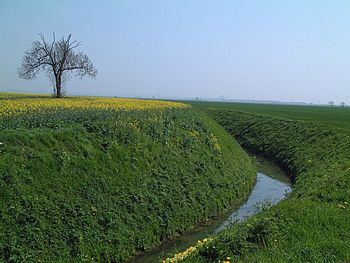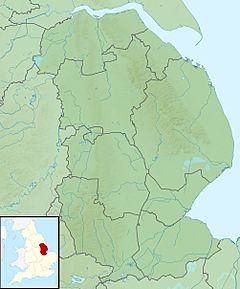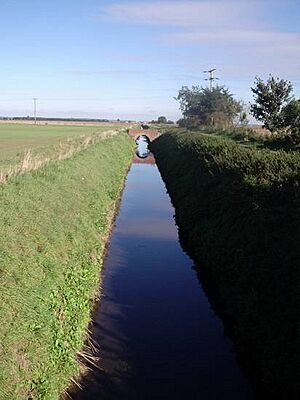Pauper's Drain facts for kids
Quick facts for kids Pauper's Drain |
|
|---|---|

Pauper's Drain, Crowle
|
|
|
Outfall to the River Trent shown in Lincolnshire
|
|
| Country | England |
| Counties | Lincolnshire |
| Physical characteristics | |
| Main source | Crowle, Lincolnshire 53°36′17″N 0°50′38″W / 53.6047°N 0.84381°W |
| River mouth | Paupers Pumping Station, Amcotts, Lincolnshire 53°37′40″N 0°42′52″W / 53.6277°N 0.71450°W |
| Length | 9 km (5.6 mi) |
| Basin features | |
| Basin size | 42 km2 (16 sq mi) |
| Tributaries |
|
| Progression : Pauper's Drain—Trent—Humber | |
Pauper's Drain is a small waterway in North Lincolnshire, England. It flows into the River Trent and is about 9 kilometers (6 miles) long. This drain helps manage water for a large area of flat farmland, about 42 square kilometers (16 square miles) wide. This area is located east of the Isle of Axholme.
It starts near the Crowle water treatment plant. From there, it flows east, passing south of the village of Eastoft. Finally, it reaches the Paupers Pumping Station next to the River Trent, north of Amcotts.
How the Drain Works
The Paupers Pumping Station is very important for the drain. It has three large pumps. These pumps help keep the water level in the drain just right. They do this by pumping water into the River Trent when needed.
Next to the pumping station is a special gate called a sluice. This sluice also lets water flow out into the Trent. This happens when the tide in the Trent is low, allowing gravity to pull the water out.
Why the Drain is Important
Pauper's Drain is vital for keeping the land dry in this low-lying area. Without it, the fields would flood easily. The Isle of Axholme & North Nottinghamshire Water Level Management Board is in charge of looking after the drain. They make sure it works well.
The Board does regular maintenance, like mowing the sides of the drain each year. They also "rod" the drain, which means clearing out any blockages to keep the water flowing smoothly.
What's in a Name?
The name "Pauper's Drain" has an interesting history. It is believed that the drain was built by laborers who were paid through the "poor rate." This was a tax used to help people who were very poor, sometimes called "paupers."
People think this drain was built a long time ago, even before the 17th-century drainage projects. Those bigger projects were led by a famous engineer named Cornelius Vermuyden, who worked to drain many wetlands in the area.



